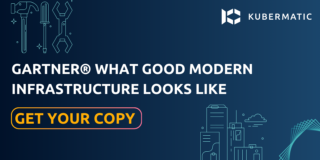


Kubernetes 1.21 Is Here!
The first Kubernetes release of 2021, Kubernetes 1.21: Power to the Community, is finally here! In this blog post, we’ll highlight the most notable improvements of this release and let you know when and how you can benefit from them as a Kubermatic user.

Bringing Your VMs to Kubernetes With KubeVirt
This article is dedicated to the open source project KubeVirt.io, which allows you to bring your virtual machine workloads to Kubernetes. A second part will explain how to use it with Kubermatic Kubernetes Platform.

Using Kubernetes And GNS3 for Virtual 4G Simulation
This blog post is about how to deploy a virtual 4G stack using GNS3 and Kubernetes. It covers the following:
Open5gs vEPC OAI UE and eNodeB simulator Kubernetes 1.17.3 Calico CNI Vyos Router GNS3 (This is optional, it makes simulations easier) The motivation for this blog post stems from the fact …

Multi-Cluster Kubernetes Management With Operators
This blog post will cover why you need multi-cluster management, how Kubermatic Kubernetes Platform leverages Kubernetes Operators to automate cluster life cycle management across multiple clusters, clouds, and regions and how you can get started with it today.

The Smallest Kubernetes Cluster: Scaling Down to the Edge
Edge computing is creating a new internet. In an age where consumers and businesses demand the shortest possible delay between asking a question and getting an answer, edge computing is the only way to reduce the time it takes to provide this insight.

Keeping the State of Apps 1: Introduction to Volume and volumeMounts
In this part of our Kubernetes 101 series, we will bring persistence into play. You will learn how to provide persistent storage in the form of different volumes to the Pods.

Exposing Apps With Services
In this guide, we will discuss how to expose an application to the outside world via Services. We will cover five different types of Services and their usage. Basic knowledge of Pod and Deployment is suggested to follow the hands-on practice on this part of the series.
Services in Kubernetes A …

Rego in a Nutshell
In earlier articles from this series, we have demonstrated how to use Open Policy Agent (OPA) with Kubermatic Kubernetes Platform. Open Policy Agent uses its own native language, Rego, to define queries. This tutorial presents an overview of the main features of Rego which will allow you to …

Setting up OIDC Authentication & Audit Logging With Kubermatic KubeOne
In this article we’re going to set up a Kubernetes cluster with OIDC authentication and audit logging enabled. We prefer to manage our team associations via GitHub Teams and we want to grant permissions inside the cluster based on these teams, so we will use Dex as a bridge between Kubernetes …

Kubernetes Operators: Automating Complex Application Lifecycles
What Is a Kubernetes Operator? Kubernetes Operators are a way to package, deploy, and manage Kubernetes applications. This includes Kubernetes applications deployed on Kubernetes and those that are managed using the Kubernetes API or kubectl.
A Kubernetes Operator is a controller specific to an …

Introduction to Deployment Strategies
The last part of this Kubernetes 101 series focused on ReplicaSets and Deployments and why it is better to use Deployments rather than Pods to manage your Kubernetes applications. In this part of the series, we will walk you through different types of Deployment strategies to give you the insight of …

Kubernetes Security Best Practices
With recent platforms like Kubernetes and containers, CVE (Common Vulnerabilities and Exposures) can be found frequently, even in the most common utilities. They can pose a range of challenges for those in charge of security.
There have been cases in the past where a critical issue let an attacker …
